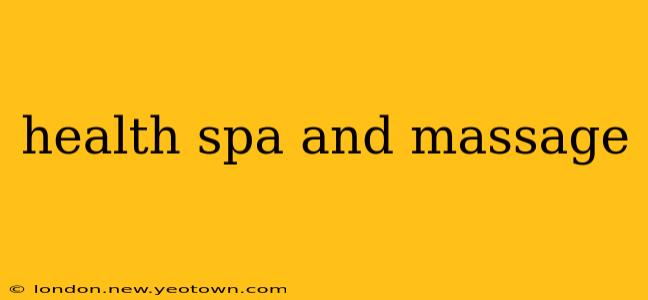Ah, the sheer bliss of sinking into a warm, bubbling jacuzzi after a long day. Or the gentle kneading of expert hands melting away tension in your knotted shoulders. The world of health spas and massage offers a sanctuary of relaxation and rejuvenation, a haven where you can escape the stresses of daily life and reconnect with your inner peace. But with so many options available, how do you navigate this world of wellness? Let's dive in and explore the many facets of health spas and massage.
What are the benefits of visiting a health spa and getting a massage?
The benefits extend far beyond simple relaxation. Regular spa visits and massages can significantly improve your physical and mental well-being. Think of it as preventative maintenance for your mind and body. Massage therapy helps alleviate muscle pain and stiffness, improves circulation, reduces stress hormones, and can even boost your immune system. Spa treatments, from facials to body wraps, nourish your skin, leaving you feeling refreshed and revitalized. It’s a holistic approach to wellness, focusing on the interconnectedness of your physical and mental health.
What types of massage are available at health spas?
The world of massage is incredibly diverse, offering a personalized experience tailored to your specific needs. From the deeply therapeutic Swedish massage to the invigorating sports massage, the options are vast.
Swedish Massage: This classic technique uses long, flowing strokes to relieve muscle tension and improve circulation. It’s a great choice for relaxation and stress reduction.
Deep Tissue Massage: As the name suggests, this massage targets deeper muscle layers, releasing chronic tension and knots. It’s ideal for those experiencing persistent pain or stiffness.
Hot Stone Massage: Smooth, heated stones are used to warm and relax muscles, penetrating deeper than hands alone can reach. It's incredibly soothing and helps to improve circulation.
Sports Massage: This dynamic massage technique is designed to address the specific needs of athletes, helping to prevent injuries, improve performance, and accelerate recovery.
Many spas also offer specialized massages like aromatherapy massage (using essential oils), prenatal massage (designed for pregnant women), and reflexology (focusing on pressure points on the feet).
How to choose a health spa and massage therapist?
Choosing the right spa and therapist is crucial for a positive and effective experience. Look for spas with positive reviews and a reputation for cleanliness and professionalism. Read online reviews carefully, paying attention to comments about the therapist's skill, the spa's atmosphere, and the overall experience. Don't hesitate to call the spa and ask questions before booking your appointment. A good spa will be happy to answer your questions and help you choose the right treatment.
What should I expect during my first visit to a health spa?
Your first visit should be a relaxing and enjoyable experience. Most spas offer a consultation before your treatment, allowing you to discuss your needs and preferences with a therapist. You'll be asked about any health concerns or injuries. The therapist will then guide you through the process, ensuring your comfort and relaxation throughout the treatment. Many spas also offer a variety of amenities, such as saunas, steam rooms, and relaxation areas, to enhance your overall experience.
What should I wear to a massage?
Most spas provide robes and towels, so you won't need to bring anything special. However, it's always a good idea to wear comfortable clothing that you can easily change into and out of. Avoid wearing any jewelry that might be uncomfortable during the massage.
Are there any health conditions that would prevent me from getting a massage?
While massage is generally safe, there are some health conditions that may require modifications or contraindications. Conditions such as deep vein thrombosis, open wounds, or certain cancers may make massage inadvisable. It's always essential to consult your doctor or healthcare provider if you have any health concerns before booking a massage.
How often should I get a massage?
The frequency of your massages will depend on your individual needs and preferences. Some people opt for weekly massages, while others may prefer monthly treatments or even less frequently. Listen to your body and schedule massages based on your needs. Regular massages can significantly improve your overall well-being and help you maintain a healthy lifestyle.
By understanding the various types of massage, carefully selecting a spa and therapist, and considering your individual needs, you can embark on a journey of relaxation and rejuvenation, transforming your health spa experience into a cherished form of self-care. So, treat yourself—you deserve it!

